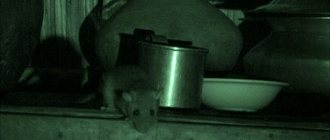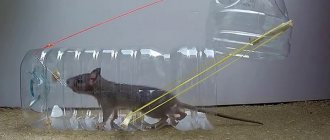Teeth grinding
This phenomenon usually accompanies the bulging of the eyes described above. There is no need to be scared, the rat belongs to the rodent family, and its teeth are constantly growing. When a rat grinds its teeth, it tries, so to speak, to moderate their growth, to make sure that they do not grow too quickly. Moreover, teeth grinding in rats is similar to purring in cats - this is what they do in moments of relaxation and peace. This creates vibrations that help the eyeball protrude - therefore, these two phenomena are interrelated. At the same time, a rat may grind its teeth when it is scared or in pain, so pay attention to the circumstances under which this happens (for example, when you pet it or vacuum near the cage).
Original publication: 10 Common Rat Behaviors. Author: Laura Doering.
What do rat sounds mean?
All rodents are characterized by certain methods of transmitting information to their fellows. They communicate not only through movements, but also using their voice. It turns out that every sound has its own meaning: to warn, to scare, to protect. Listen to your pet and very soon you will be able to recognize his needs and learn to talk to him.
Squeak
As you know, all rats can squeak, however, not everyone knows that squeaking can vary in tone, intensity and emotional coloring:
- The rat makes a quiet, calm squeak when it experiences positive emotions, for example, at the sight of its owner or when communicating with him;
- a long, shrill squeak signals that the animal is very frightened of something and is trying to notify others of the danger;
- a loud but sharp sound made by a rodent indicates its bad mood and reluctance to make contact at the moment.
Important! A rat can be very frightened by switched on household appliances: a vacuum cleaner, blender, coffee grinder. Therefore, while using them, it is better to take the animal’s cage to another room.
Grunt
Sometimes you can hear a rat quietly grunting through its nose. This is usually a sign of relaxation and enjoyment. If similar sounds occur regularly and are repeated for a long time, you need to show the animal to a veterinarian to make sure there are no pathologies. Often this symptom is accompanied by rhinitis or lung diseases.
Chirping
Rats can produce a very strange, chattering sound that occurs as a result of the rodent's teeth chattering frequently. This signal means a warning of danger. If the animal behaves restlessly and you can hear chirping, you need to check the room where the cage is located. Animals often behave this way when they notice cats or pigeons outside the window.
Wheezing when breathing
Breathing accompanied by wheezing is ignored by many rat owners and is completely in vain. If an isolated case can be discounted, then the regular occurrence of such a symptom may be an alarming signal. Most often, wheezing is a sign of respiratory infections (bronchitis, pneumonia), and such a sound can also appear when heart disease occurs. In such cases, you need to provide the animal with rest, do not pick it up and take it to the veterinary clinic as soon as possible.
Did you know? Rats have the highest level of intelligence of all rodents and are as trainable as dogs.
Hiss
Like any other living creature, rats are susceptible to outbursts of aggression in stressful situations. A clear indication that the animal is seriously angry is an angry hiss. If at this moment there are other individuals near the animal, it is better to move them away to prevent conflict. Also, do not pick up your pet until it calms down.
Whistling
When a rat wants to attract someone's attention, it makes a characteristic sound in its throat, like a whistle. This way the animal can call its owner to play and communicate. If there are several rodents, you can hear the males periodically whistling with increasing volume. In this way, they notify females that they are ready to mate.
Coughing
If you hear your pet coughing, observe him. A healthy, vigorous, active animal can thus frighten its fellows or other animals. This is normal behavior; males begin to do this when defending the position of leader. If the rat’s behavior changes, it becomes lethargic, along with coughing, weakness or anxiety appears, you should not postpone a visit to the doctor.
Did you know? In the journal Science in 2016, the results of a study were presented that confirmed the presence in the rat brain of a center responsible for the reaction to tickling. The experiment showed that the animals even emit a high-frequency sound, like laughter.
Sneezing
A rat can sneeze for various reasons, such as strong odors, mechanical irritation of the nasal mucosa, and colds. As with coughing, sometimes this is an attempt to dominate other individuals. It is necessary to check how often the sound is repeated, whether there are any drafts, and evaluate the behavior of the animal. If signs of illness are present, examination by a specialist is required.
Hiccup
When overeating, hypothermia or fright, the rodent may develop hiccups. As a rule, it goes away on its own after a while. If your rat hiccups constantly, this may indicate digestive problems or parasite infestation. In such cases, you need to change the food and also show your pet to the veterinarian.
Grinding of teeth
Quite often you can hear a rat quietly grinding its teeth. At such moments, the animal’s body may even vibrate slightly. But there is no reason to worry, because this is how the rodent expresses bliss. If your pet begins to grind, you can rest assured that at that moment he is absolutely content and happy.
How do rats talk?
In general, decorative rats behave quite quietly and make various sounds only when communicating with the owner or in other circumstances that cause emotional reactions. As discussed earlier, a rodent mainly uses squeaking or grinding its teeth to contact humans.
Important! If a rat wheezes and cannot get up, you should absolutely not pick it up; you must transport it to the veterinarian directly in the cage to avoid complications.
Animals communicate with each other using high-frequency sounds that people are unable to hear (about 120 decibels). However, if we are talking about a fight, attracting a female, or communication between little rat pups by their mother, then in such cases most often the rodents hiss, whistle or squeak.
What sounds indicate health problems?
In most cases, wheezing sounds are a sign of advanced lung disease or respiratory infection. Successful treatment of wheezing requires an environment free of dust and contaminants, as well as immediate contact with a veterinarian who will prescribe the necessary antibiotics.
Wheezing in rats is also a sign or symptom of a respiratory infection. Sometimes this is due to an exacerbation of mycoplasma. Almost every rat will develop some form of respiratory disease during its life. In fact, mycoplasma infection can be mild or very serious. This is where antibiotics come to the rescue.
Why do rats squeak?
Both wild and decorative rats talk to each other not only through movements and touches, but also use a variety of sound signals for this purpose. By emitting various signals, rodents warn each other about possible danger, about readiness to mate, or declare the inviolability of their territory. Tailed pets also communicate with their owners using sounds, thus expressing their love, gratitude or dissatisfaction.
Do rats use sounds to communicate with each other?
Rats are one of the most social animals. In the wild, the survival of an entire colony depends on its ability to communicate. For example, the cry of a rodent, warning of danger, helps save, if not all, then a significant number of rodents. And although animals receive most of the information through their sense of smell, sound signals are also present.
It has been noticed that domestic pets “talk” much more often than their wild relatives. Smart animals quickly understand that it is impossible to convey their needs to their owner in the usual ways. By making sounds and observing how a person reacts to them, animals develop a conventional language of communication. The rat owner also begins to understand what the pet is telling him.
According to scientists, animals use more than six hundred sounds to transmit information among themselves. True, most of them take place in the ultrasonic range, which the human ear is unable to discern.
Most often you can hear young animals looking for their mother or expressing delight during games, calling males to mate, or crying about danger or in pain.
Can pet rats hiccup?
Hiccups in an animal occur against the background of:
- overeating;
- nervous excitement;
- hypothermia;
- helminthic infestation.
If the case of hiccups is isolated, then there is no need to worry - perhaps the rat has simply eaten too much. If attacks of hiccups occur periodically, then you need to think about changing food and carrying out preventive deworming.
Important! When hiccups are accompanied by heavy, wheezing breathing, take your pet to the vet immediately. There is a high risk of pneumonia or pneumonia. Without proper treatment, this can lead to the death of your pet.
Teeth grinding
Rodent lovers also hear another specific sound, which experts call “bruxism.” Many people suffer from bruxism (“teeth grinding”) during sleep. With rats the situation is a little different; you can hear them grinding their teeth, as if they were grinding something very hard. A sort of creaking or grinding sound. Everything is natural - the usual behavior of all rodents. Some rats "gnash" quite intelligently; These sounds can only be clearly distinguished when in close proximity to the cell. By the way, bruxism is a good sign for rats: it means that she is now relaxed, and everything is fine in her life!
Grinding your teeth is actually very important for rats. Her front incisors are constantly growing and need to be ground down. Take a closer look at your little pet to see if the incisors are causing him any discomfort. Is everything okay with eating? If you see something suspicious, consult your veterinarian. In particularly advanced cases, surgery is sometimes indicated.
Can a rat scream?
The cry of a rat is similar to a long squeak, only much louder. This is often a sign of extreme disapproval or fear. If you introduce rats to each other, one of them may scream, especially if it is much younger than the other. Young rats are still learning hierarchy and social skills, so they will often scream when confronted by an older, dominant rat if they don't know what else to do.
If you hear screaming from a rat cage, you need to assess the situation. If it looks like one of your rats is cornered or abused, you will need to separate them and try the introduction later.
How rats squeak and “talk”, the meaning of the sounds made
Both wild and decorative rats talk to each other not only through movements and touches, but also use a variety of sound signals for this purpose. By emitting various signals, rodents warn each other about possible danger, about readiness to mate, or declare the inviolability of their territory. Tailed pets also communicate with their owners using sounds, thus expressing their love, gratitude or dissatisfaction.
What sounds do domestic and wild rats make?
Rats have been found to make a combination of sounds depending on how they are feeling or what is happening to them.
Just like us, pet rats sneeze, cough, hiss, wheeze and hiccup from time to time. But these sounds can mean different things. For example, wheezing and coughing signal health problems that can quickly become life-threatening if not treated promptly and properly.
If you listen carefully, you can understand what your rat is telling you. Let's find out more about what sounds rats make and why.
- Hiss
Hissing is an aggressive sound that a rodent owner may hear during particularly stressful social encounters, such as introducing a new rat into another pet's cage. In most cases, the hissing is what you'll hear before the fight starts, so be prepared to intervene safely if necessary.
Important: Never handle a hissing rat without thick gloves or a towel, as there is a chance that the animal will attack you.
- Squeak
A short squeak can be heard if you accidentally startle the rat by trying to pet it or in some other way. You may also hear a similar squeak when rats are grooming each other or communicating in a friendly tone.
Rats most often squeak as a sign of fear or minor irritability, but not when they are in pain or in immediate danger.
A prolonged squeak is usually the sound of a rat's protest. The owner can hear a similar squeak when the rats are playing and one of them requires rest. If you hear this sound and none of your rats appear sick or injured, it simply means one of the pets needs a break.
- Whistling
A rat can make a long throat whistle if it needs attention and affection from its owner. But a loud whistle may mean that males are calling females to mate.
- Grinding teeth
Because rodents' teeth constantly grow throughout their lives, it is extremely important that the rat grinds its teeth frequently to maintain optimal tooth length. If your rat's teeth are too long, it can lead to a variety of difficulties, including interfering with his ability to eat, wash himself, and even cause excruciating pain. Overgrown rat incisors can cause ulcers and other sores in the rodent's mouth, and misalignment of the jaws prevents them from closing properly. But don't worry. Unless your rat suffers from deformed jaws due to their genetics or a birth defect, there is no reason to worry about your pet's teeth.
In fact, teeth grinding in rats involves more than just maintaining the correct length of the incisors. They often chatter their teeth when they experience strong emotions such as fear and stress, as well as happiness or overall satisfaction with life. So don't be alarmed if your rat starts grinding its teeth when you pet it. This doesn't mean she's stressed, it means she's enjoying herself, feeling relaxed, calm and safe.
Some studies even show that tooth rubbing in comfortable and enjoyable situations in rats is similar to the purring of a cat. Just a way to show my appreciation to you.
- Chirping
When threatened, a pet rat usually makes a chattering sound. Check the area around your pet for dangerous objects or other animals.
Rat body language
Do you think only dogs can wag their tail? No – a rat’s tail can also tell a lot about the mood of its owner. The rat carefreely waves its tail from side to side - it means it’s glad to see you! Almost a dog, right? But the tail seems to twitch, or even freezes in one, sometimes unnatural, position - this is anxiety. Moreover, the rat is ready for defense!
Severe fear or stress is expressed in rats by the fact that the tail “walks” with a large amplitude. The animal is most likely very agitated and is clearly “out of its mind.”
Rats often use their front paws as a means of communication. They can wave their paws to attract attention. They may “bounce” with their forelimbs, indicating to be left alone. The treat will also be carefully grabbed by the front paws, and the expression on the face will tell you a lot!
The rat can sit down, slightly stooped or hunched, its muzzle is raised high, its paws are ready for “work”. This is a defensive pose, the rat is ready for aggression. There is no need to pester your pet at this moment. Let him burn out, calm down, and rest.
You can often notice that the animal’s fur seems to stand up and bristle. This indicates stress, fear, and also that your pet is simply cold. Move him to more comfortable conditions!
The sounds of rats or what decorative rats are talking about
How do rats talk?
You know that of all types of domestic rodents, decorative rats are the easiest and fastest to tame and can be trained and educated (read more about keeping them at home here). Not hamsters, not guinea pigs, but rats. At the same time, unlike other types of rodents, rats have a hard time with a lack of attention from humans and suffer greatly from this. And, in order to somehow attract attention to themselves, they may even begin to make certain sounds.
We will tell you about the sounds rats make and how to learn to understand your rat - we will tell you about this in our new publication...
A few more reasons for squeaking
Any owner of a decorative rodent should definitely know the meaning of such signals, but it is also important to be able to understand the intonation and situational context of the squeak:
- when your pet squeaks while stroking it, you should suspect the presence of a wound, touching which causes pain;
- the rat is probably happy and in a good mood if in the owner’s hands it squeaks quietly or tries to lick your hand;
- young rodents often squeak, expressing delight at the fun and games of their fellows;
- a squeak can also indicate fear, especially if such a squeak is abrupt and loud. Most likely, the rodent sees danger, for example, a sneaking cat, and calls the owner for help;
- when an animal is picked up and at the same time it makes a squeak, then the rat may be unhappy with being disturbed.
Whether rats squeak in pleasure or pain, they want to be understood. Rat language, varied and interesting, is easy for every caring owner to master. To do this, you just need a little sincere attention, which will certainly be appreciated by your little ward.
Sources:
https://animallittle.ru/zvuki-domashnih-krys.html https://nutriacultivation.ru/archives/9117 https://moy-homyachok.ru/domashniaya-krisa/pochemu-krysy-pishhat.html
Coughing and sneezing - is the rat sick?
The vast majority of rats rarely cough. However, their cough is usually a consequence of shortness of breath or difficulty breathing. Some rats cough when they are choking, which often causes them to jump back and forth. This causes their throat to feel sore, so they may choke if they eat too quickly. Therefore, the rat needs to be taken to a veterinarian for an examination.
Decorative sphinx rat is sick
Some rodents may also sneeze. This happens for a variety of reasons. So let's look at some of the most common cases.
- Rat sneezing due to illness
Constant sneezing is often a sign of illness. If this is the case, you will notice symptoms such as poor appetite, changes in activity, wheezing, and discharge from the nose and eyes. These accompanying symptoms are usually accompanied by general weakness or discomfort.
- Sneezing caused by allergies
Many rats are prone to developing allergies under certain circumstances, so this shouldn't surprise you. How to recognize this?
Just like humans, rats can have different allergic reactions to different things in their environment.
When rats have allergies, they sneeze at different times quite often. If your pet recently started sneezing, and you recently changed his bedding, food, or added new items to his rat cage, they most likely caused the allergy.
- Sneezing due to new scented oils, candles, air fresheners and pets
All of these can cause sneezing. A new animal, such as a dog or cat, can cause a similar reaction when introduced into a rat's environment. While rodents may quickly become accustomed to new animals in the home, they may never become accustomed to these odors in the air.
The same goes for air fresheners, oil warmers, oil diffusers, candles, incense and wax melts. All of these can irritate the rat's respiratory system and make it feel nauseous. But not all rodents are easily irritated.
Essential oil diffusers are growing in popularity these days. Although they may have therapeutic effects on people, be careful when distributing these oils. They are not recommended because the respiratory system of pet rats is quite fragile, which increases the risk of adverse reactions.
Meaning of beeps
How does a rat squeak? - extremely diverse. The rather rich tongue of a rodent signals that the animal is afraid, in pain, indignant, happy at the appearance of its owner, etc. The only way for a pet to express its emotions is through sound signals.
In order to know why a rat squeaks, every attentive owner must learn to decipher the sounds made by the pet:
- If a rat screams for a long time or squeals heart-rendingly , it means that it is in great pain. It is necessary to examine the animal and identify the cause of the pain, be it damage from a sharp object or a wound received in a fight with a fellow animal. If there are no external wounds, you need to seek the help of a veterinarian - the internal organs of the rodent may be damaged;
- if the owner hears a hoarse squeak , then the animal is either angry or aggressive. As a rule, such a signal is aimed at intimidating the opponent. At this time, the rat is unlikely to like being disturbed, so you need to give it time to “cool down” and calm down;
- if the animal hisses , then this is also a signal of aggression and hostility. Most likely, it declares to its fellows its territorial rights or the rights to mate with the chosen female;
- if an animal chirps , then it is probably scared and warns community members about potential danger;
- but the pet grunts because it rejoices and experiences complete satisfaction;
- From the same positive emotions, a rodent can grind its teeth ;
If your pet rat squeaks strangely, either coughing or sneezing, it most likely has a cold and the animal needs treatment. In this case, be sure to show the animal to the veterinarian.











